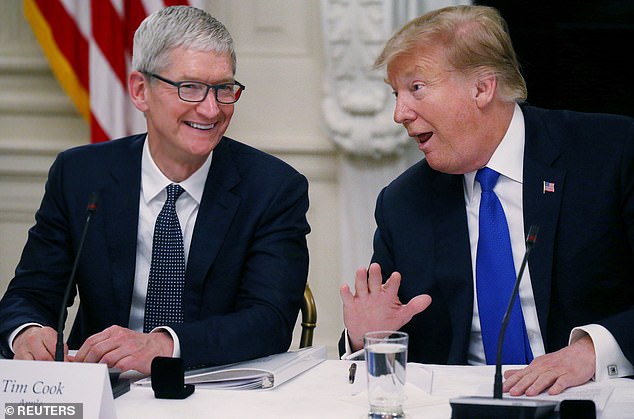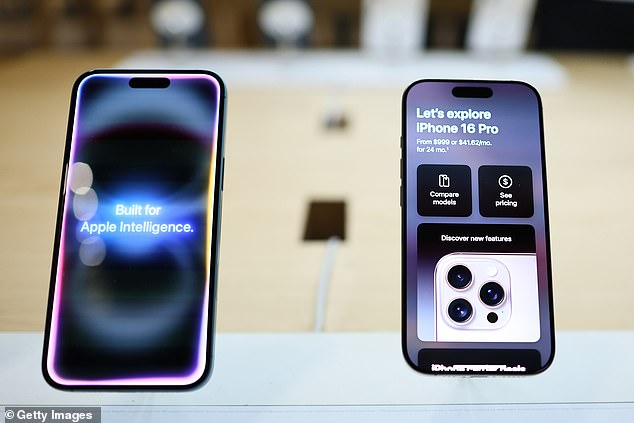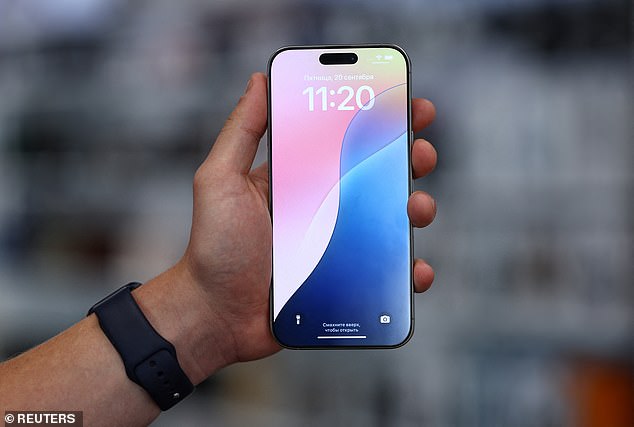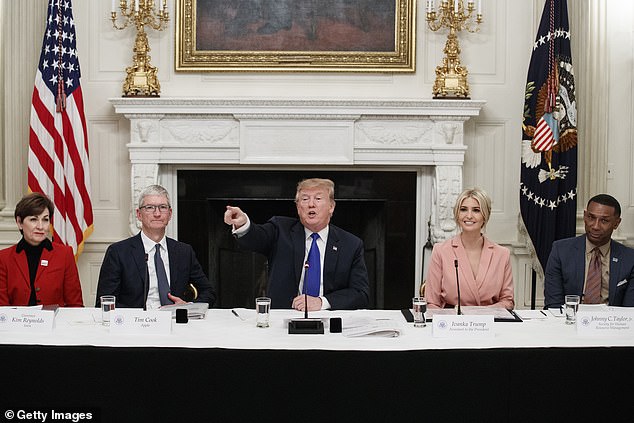The cost of buying an iPhone is set to skyrocket by hundreds of pounds as the device becomes stuck in the crosshairs of an increasingly bitter trade war.
Most of Apple’s devices are made in China but the parts involved come from a staggering array of nearly 50 countries – all of which have seen tariffs slapped on them by Donald Trump.
This alone has led to fears of spiralling price rises, panic buying and has seen Apple’s share price sink to such an extent that it lost the crown as the world’s most valuable company to Microsoft.
But experts now predict the White House‘s insistence it could manufacture the devices on home soil – rather than importing from Asia – could make matters far worse.
And yesterday China – which assembles nine in every 10 iPhones – raised the stakes further by responding with its own sky-high tariffs, set to further unsettle the market.
President Trump last night announced a 90-day pause on tariffs – except for China, due to their retaliation, increasing their levy to a staggering 125 per cent.
‘I thought that people were jumping a little bit out of line. They were getting yippie, you know, getting a little bit yippie, a little bit afraid,’ he said at the White House during an event honoring car racing champions.
Trump appeared to be referring to the ‘yips’ – when golfers start twitching and missing putts.

Apple boss Tim Cook ensured his company got an exemption for billions of dollars in imports of Chinese-made smartwatches and other components during President Donald Trump’s first term in the White House

The iPhone 16 Pro currently costs £999, and the ‘max’ version costs £1,199
He added: ‘The bond market is very tricky. I was watching it. But if you look at it now, it’s beautiful. The bond market right now is beautiful. But yeah, I saw last night where people were getting a little queasy.’
Experts yesterday told MailOnline the cost of a £999 iPhone 16 Pro in Britain could rise by up to £400 as a result – but in America some price rise predictions have been far higher, with some suggesting the cost of the devices could triple.
Even though the UK has not imposed tariffs, experts say it is unlikely Apple boss Tim Cook will want to set various different price points around the world, so any increase in the US will likely be mirrored in the UK and elsewhere.
The product itself has become a symbol to illustrate the real-life consequences of the global trade war sparked by the US president’s desire to ‘make America wealthy again.’
Apple has one of the most complex supply chains that has ever been designed in human history, spanning almost 50 countries across the globe, with various components sourced from specialist companies, chiefly in East Asia.
China is the main hub for iPhone assembly (80 per cent), with India putting together 10-15 per cent and Vietnam making up the bulk of the rest.
Taiwan’s strategically important chipmaker TSMC produces the iPhone’s Apple-designed processors, whilst South Korean firms Samsung and LG provide most of the screens.
The camera components come from Japan, South Korea and Taiwan, while sensors and batteries come from across the Far East, the US, France and Germany.

Ben Barringer, global technology analyst at financial experts Quilter Cheviot

The iPhone 16 Pro Max, pictured, costs £1,199 in the UK
Analysis of Apple company supplier information shows 84 per cent of iPhone component suppliers have some links to mainland China, at 158 out of 188 suppliers.
Taiwan and Singapore in second and third place still fall far behind China for supplier locations.
Other popular locations are Japan, South Korea, Vietnam and Thailand, as well as obviously the US, with 26. Germany has the most supplier locations in Europe, with nine.
Ben Barringer, global technology analyst at financial experts Quilter Cheviot, told MailOnline: ‘The tariffs announced are going to have a profound impact on supply chains globally, and not just on US consumers.
‘Ultimately Apple is interested in maintaining its growth margin, so increases in the raw costs will predictably increase the costs of the iPhone.
‘The Apple chief executive will then have two choices – do you put up the price, or take a hit on your growth margins?’
He added: ‘My logic would say that the tariffs into the US impact the cost of making the iPhone and the Chinese tariff will increase the retail price in China.’
‘Donald Trump’s tariffs are ultimately bad news for consumer electronics.’
President Trump initially announced plans to slap a 54 per cent tariff on Chinese imports, including the millions of iPhones sold domestically every year.
But he later almost doubled the levy to 104 per cent, prompting China to introduce its own 84 per cent tariff on US-imported goods, coming in place on Thursday.
Undeterred, President Trump has signalled the US could fire up domestic production of the cherished device, buoyed by Apple’s decision to invest $500 billion to expand its facilities Stateside over the next four years.

President Donald Trump flanked on either side by Apple boss Tim Cook, left, and advisor, daughter Ivanka Trump, at the White House

Harry Mills, founder of specialist currency management firm Oku Markets
But Harry Mills, founder of specialist currency management firm Oku Markets, told MailOnline: ‘This would take a Herculean effort of coordinating an enormous supply chain relocation, and would surely lead to price increases in the long term as US labour costs would be markedly higher than in China and Taiwan.
‘Increased costs of production for Apple would ultimately mean higher prices for UK consumers – that is unless you expect Apple to swallow these higher costs and take a hit to its margin.’
He said the tariffs alone would likely have a knock-on impact on the price of the newest handset in the UK, and that China’s retaliation would likely affect prices further.
He said: ‘As President Trump announced tariffs on imports to the United States, this increased Apple’s cost to source components and assemble its products overseas.
‘Apple’s regional pricing is peculiar in that it currently maintains the same price point in the UK and US, or $999 or £999 respectively for the iPhone 16 Pro, and $1,199 and £1,199 for the iPhone 16 Pro Max.
‘If the import costs increase by around $300 for the iPhone 16 Pro, then that could mean a £300 increase in the UK handset price. But that’s using the initial, lower 54 per cent tariff.
‘Based on import tariffs of 104 per cent from China, the device cost could rise closer to £1,600.’
During Mr Trump’s first term in 2018, Mr Cook ensured Apple got an exemption for billions of dollars in imports of Chinese-made smartwatches and other components.
But there has been no exemption this time so far.
Dan Ives, global head of technology research at financial services firm Wedbush Securities, has said the new iPhone could triple in price to $3,500 (£2,740) if produced entirely in the US.







